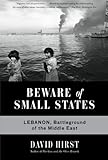As Lebanon accrues more carnage to its violent CV—most recently with the deadly bombings in downtown Beirut and the southern suburb of Haret Hreik—the media has increasingly rallied around the mantra that terrorism in Lebanon constitutes a “spillover” from the war in Syria.
According to the mainstream media chorus, this is thanks to Hezbollah's decision to participate in the Syrian conflict on the side of the government of Bashar al-Assad—and there is surely a connection. Hezbollah's intervention, however, is repeatedly cast as the fundamental starting point in the timeline of Lebanese current events, after which all other occurrences become reactive in nature.
This anti-cerebral, anti-historical approach to journalistic analysis leaves much to be desired.
For one thing, it’s not clear why bombings, assassinations, and the like are suddenly evidence of Hezbollah-induced “spillover” when they have in fact been the domestic norm for numerous decades. As Beirut-based journalist Moe Ali Nayel aptly remarked to me: “This is Lebanon being Lebanon.”
Historian David Hirst, author of Beware of Small States: Lebanon, Battleground of the Middle East, outlines the effects of the country’s existence as “an amalgam of religious communities and their myriad sub-divisions” operating within a system of institutionalized sectarianism: “Lebanon, it seems, was almost designed to be the everlasting battleground for others’ political, strategic and ideological conflicts, conflicts which sometimes escalate into their proxy wars.”
It bears mentioning that Hezbollah, now accused of converting Lebanon into the battleground it has always been, is the only effective resistance to the political, strategic and ideological goals of Israel—historically the most nefarious interferer, as Hirst notes, in Lebanese affairs.
In Hezbollah's view, its continued fulfillment of resistance duties necessitates involvement in Syria. This is a reflection not only of Syria’s integral role as a conduit for weaponry but also of Hezbollah's consideration of the al-Assad regime as a cornerstone of defiance vis-à-vis US-Israeli designs—among them, the elimination of the Palestinian cause.
Calling all jihadists
In a December column for Lebanon’s Daily Star newspaper, titled “Hezbollah is caught in an Al-Qaeda vise,” opinion editor Michael Young contends that “[t]he party has imported the Syrian war to Lebanon, even if it is not the only one to do so,” and that “[i]ts hubris has been a curse to the country”.
That Hezbollah should be assigned the bulk of the blame is curious given Young’s observations about the growing presence of Al Qaeda across the broader Middle East. With regard to recent attacks on various Lebanese targets, Young argues that, “[s]uch operations are taking place in a wider context of Al-Qaeda’s reaffirming itself regionally, especially in a swathe of territory stretching from Iraq to Syria and now extending increasingly to Lebanon. This has been characterized by the effort of Al-Qaeda franchises to seize territory and systematically eliminate all those, including Sunnis, who might stand in their way”.
Far predating the alleged Syrian war importation process, incidentally, were indicators that the Al Qaeda “curse” should perhaps be attributed to non-Hezbollah entities.
In 2007, for example, Seymour Hersh wrote for The New Yorker about efforts by the then-government of Fouad Siniora and billionaire future prime minister Saad Hariri, respectively, to fuel Sunni extremism in Lebanon as a counterbalance to Hezbollah.
These reportedly included financial and parliamentary machinations to spring Islamic militants from jail, as well as donations to extremist groups of “arms and supplies from Lebanese internal-security forces and militias associated with the Siniora government”.
Hersh quoted a senior government official who confirmed that Sunni jihadists had set up shop in the country and justified their presence with “concerns that Iran or Syria might decide to turn Lebanon into a ‘theatre of conflict.’” The same sort of logic could be deployed to justify using gasoline to put out a fire.
Iraqified Lebanonization
To be sure, the viability of the terrorism industry has to do with more than just Lebanese politicians and their marriages of convenience.
Looking at the broader regional context, it’s worth recalling that the US devastation of Iraq—advertised as an anti-terror maneuver—instead effectively launched the Al Qaeda brand in that locale.
In his book Aftermath: Following the Bloodshed of America's Wars in the Muslim World, investigative journalist Nir Rosen writes on the “Iraqification” of the Middle East and specifically “the extent to which [Lebanon] was Iraqified, with an Al Qaeda-inspired group leaving Iraq and establishing itself there at the same time as tensions between Lebanon’s Sunnis and Shiites led to clashes in the streets.”
Any accurate narrative of violent “spillover” into Lebanon should thus account for imperialist ventures “to remake the Muslim world,” as Rosen puts it—a project facilitated by “regional tensions between Sunnis and Shiites stoked by the Bush administration.”
The effort to force a self-fulfilling prophecy out of the idea of an archaic and intractable Sunni-Shia hatred at once ensures regional weakness and continued conflict—and therefore excuses for foreign meddling—while displacing the blame for violence unto the supposedly uncivilized nature of the Muslim world and its inhabitants.
As for who stands to benefit from the effort to make Syria-replicated-in-Lebanon a self-fulfilling prophecy, Lebanese academic and author Amal Saad-Ghorayeb warns that the present attacks are aimed at sowing sectarian strife and “eliminating/wearing out the [Hezbollah] Resistance by opening multiple battle fronts and overextending its security and military forces.”
In the latest round of Lebanon’s Lebanonization, then, Israel is rooting for Al Qaeda.
Belén Fernández is the author of The Imperial Messenger: Thomas Friedman at Work, published by Verso. She is a contributing editor at Jacobin magazine.



